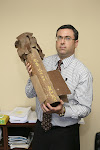Updated August 2010
On September 30, 2000, The New York Times, Associated Press and other major media outlets published a photo of a young man -- bloodied and battered -- crouching beneath a club-wielding Israeli policeman. The caption identified him as a Palestinian victim of the recent riots -- with the clear implication that the Israeli soldier was the one who beat him.
The victim's true identity was revealed when Dr. Aaron Grossman of Chicago sent the following letter to the Times:
Regarding your picture on page A5 of the Israeli soldier and the Palestinian on the Temple Mount -- that Palestinian is actually my son, Tuvia Grossman, a Jewish student from Chicago. He, and two of his friends, were pulled from their taxicab while traveling in Jerusalem, by a mob of Palestinian Arabs, and were severely beaten and stabbed.That picture could not have been taken on the Temple Mount because there are no gas stations on the Temple Mount and certainly none with Hebrew lettering, like the one clearly seen behind the Israeli soldier attempting to protect my son from the mob.
In response, the New York Times published a half-hearted correction which identified Tuvia Grossman as "an American student in Israel" -- not as a Jew who was beaten by Arabs. The "correction" also noted that "Mr. Grossman was wounded" in "Jerusalem's Old City" -- although the beating actually occurred in the Arab neighborhood of Wadi al Joz, not in the Old City.
In response to public outrage at the original error and the inadequate correction, The New York Times reprinted Tuvia Grossman's picture -- this time with the proper caption -- along with a full article detailing his near-lynching at the hands of Palestinians rioters.
The photo of a bloodied Tuvia Grossman became a symbol in the struggle to ensure that Israel receives the fair media coverage that every nation deserves.
In April 2002, a District Court in Paris ordered the French daily newspaper "Liberation" and the Associated Press to pay damages to Grossman to the amount of 4,500 Euro.
The Court condemned the Associated Press for "mispresenting [Grossman] as a member of the Palestinian community," while the court censured "Liberation" for "publishing the litigious picture with a comment edited the same faulty way, giving the picture a meaning and a scope it could not have."
Arab Abuse
Even more remarkable is that Arab groups adopted Grossman's photo to use in their own propaganda campaigns, cynically using a bloodied Jew as a symbol of the Palestinian struggle.
An official Egyptian government website used the Grossman image on a photo gallery while the Palestinian Information Center, www.islam.net, incorporated Tuvia's photo onto its homepage banner, (The graphic was removed from the site, but is reprinted here:)
Additionally, some Arab groups called for a boycott of Coca-Cola, for doing business with Israel, and circulated a series of posters to state their case. One poster shows Grossman's bleeding face juxtaposed with the Coca-Cola logo, and the tag line: "By supporting American products, you're supporting Israel."
Snopes.com reported that, ironically, since Ramallah is home to a Coca-Cola bottling facility that employs about 400 local residents (and indirectly creates employment for hundreds more), and Coca-Cola industries throughout the Middle East are operated as local businesses, any boycott of Coca-Cola in Middle Eastern countries is likely to cause more monetary harm to Arabs and Palestinians than it is to Americans or Israelis.
Snopes.com noted another irony: Pepsi is also on the Arab boycott list, with claims that the name "Pepsi" is an acronym for 'Pay Every Penny to Save Israel' or 'Pay Every Penny to the State of Israel.' As the Associated Press once noted, "Calling Pepsi a 'Jewish product' is ironic, given that Pepsi was one of many multinationals that wouldn't do business in Israel during the 40-year Arab commercial boycott of the Jewish state."
And of course the biggest irony of all is that the image chosen in the poster to represent Palestinian suffering was none other than Tuvia Grossman who nearly beaten to death by a Palestinian mob.
Click here to see the Grossman poster.

